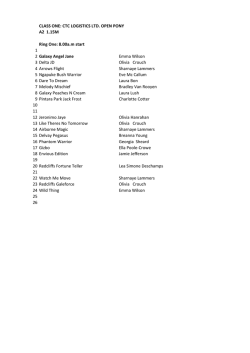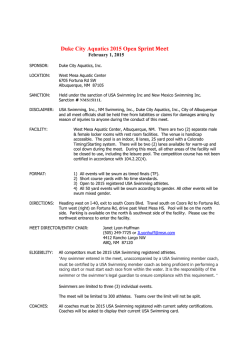
Read the PDF article HERE... - Mental Health Coalition of the
One-on-One with Patty Duke She wanted to be a nun, but Hollywood had other plans. Now the Oscar winner talks about the faith that never left her. B Y R I TA E . P I R O O PHOTOS PROVIDED BY THE AUTHOR NE OF THE MOST popular teen stars on television, now the proud grandmother of six, Oscar winner Patty Duke, 68, is enjoying her sixth decade as a professional actor. Happily ensconced in the northern Idaho home she shares with her husband of 29 years, Michael Pearce, she is grateful for both her past successes and her present joys. “I’ve been richly blessed,” she says softly. “When I pray, I never ask for material things. I offer only prayers of gratitude.” By the time she entered first grade at Sacred Hearts of Jesus and Mary School in New York City, Anna Marie Duke (she prefers to use her baptismal name) had already caught the attention of several talent scouts. By the time she made her first Communion, she was well on her way as a child star, having appeared in commercials and on television, sharing the bill with the likes of David Niven, Richard Burton, and Sir Laurence Olivier. As a child, though, acting remained the furthest thing from her mind. “More than anything else, I wanted to be a nun,” Anna reveals. “My friends and I would play ‘nun’ all the time. We would wrap a piece of loose-leaf paper around our forehead and neck, put a dark scarf around our head, and we would play school, taking turns being the teacher or the mother superior.” Fr anciscanMedia.org Given what lay ahead for young Anna Marie, she could have used a cloister of nuns praying around the clock for her. Foundation of Faith The third and youngest child of John Patrick and Frances (McMahon) Duke, Anna was born on December 14, 1946, in the Kips Bay section of New York City. A former Navy man, John’s battle with alcohol forced him to leave the family, which included an older daughter, Carol, and a son, Raymond, when Anna was 6 years old. “I rarely saw him after he left,” she recalls. “I promised myself that when I was older, I would find him and make him better.” Though remembered by Anna as a “loving and terrific mom,” Frances Duke struggled with frequent episodes of severe depression, including several hospitalizations. “My mother depended upon going to church, praying the rosary to help her deal with her depression. We didn’t have the knowledge, the treatments back then. She was desperate that through her faith she would stop being depressed.” Attending Mass at Sacred Heart Church provided Anna with her first taste of theatre. “I loved all the ritual involved in Mass, what some people call the ‘bells and smells.’ It had such high drama with the mystique of Latin February 2015 ❘ 29 thrown in for good measure. I was the first one in my class who could perfectly recite the Confiteor in Latin,” she boasts. Life with the Rosses PHOTO PROVIDED BY THE AUTHOR Patty Duke became a staple in American homes with her iconic television series The Patty Duke Show, which was created especially for her, about identical cousins and their misadventures. The series ran from 1963 to 1967. At age 7, Anna caught the attention of John and Ethel Ross, a husband-and-wife team of talent agents, both now deceased. Recognizing Anna’s potential for acting success, the couple devoted themselves to managing both her career and her life. Under their tyrannical hold, Anna was stripped of nearly everything she knew and loved, starting with her name. “The managers did not think that my name was perky enough, so they decided to change it. Without any discussion, they barked out the order to me saying, ‘All righty, Anna Marie is dead. You’re Patty now.’” In later years, Anna would define this event as the beginning of her personal destruction. The Rosses never disguised their great disdain for Mrs. Duke, whose depression had become so severe that she could barely function. “The managers said to my mother, ‘Now, Mrs. Duke, you know that you are unable to take care of your daughter,’” Anna remembers. “‘If you really love her, you will let her live with us so that we can give her everything you cannot.’” Despondent and terribly intimidated, Frances Duke saw in the Rosses’ offer a way to ease the doleful life she believed she had created for her youngest child. For nearly 10 years, until age 18, Anna lived with her managers in their Manhattan apartment, sleeping on a cot in a hallway. Anna’s every word and movement were monitored and controlled. Her daily actions were reviewed and criticized each evening at dinner. She could not talk on the telephone, entertain any friendships, or be in any room with the door closed. She could use the bathroom for only 10 minutes at a time. The Rosses were addicted to alcohol and prescription drugs, both of which they would periodically give to young Anna as a way to help her get through her demanding workload. The managers’ word was law. Anna recalls a commercial which cast her between them and her Catholic faith. 30 ❘ February 2015 St A n t h o n y M e s s e n g e r . o r g “It was for a canned meat product. We were in the middle of filming when I remembered that it was Friday, which meant that I could not eat meat. I froze in fear. Do I eat meat on Friday and go against God or do I refuse and go against the managers? It didn’t take me long to figure out the answer. I went ahead and ate the meat. Being in trouble with God would be a lot easier for me than being in trouble with the managers.” Another incident involved Anna’s muchadored first Communion dress. “My mother didn’t have two nickels, but she managed to buy me a beautiful dress and veil that I loved. A part came up very quickly and I needed a fancy dress. My managers called my mother and ordered her to bring over my first Communion dress, which they proceeded to dye pink! My mother was horrified and I was heartbroken,” she recalls mournfully. Patty Duke and Her Miracle Patty Duke owes a debt of gratitude to Helen Keller. In 1959, when she was 13, she starred on Broadway as Helen Keller with costar Anne Bancroft as Anne Sullivan. The show ran for almost two years, and her performance was so acclaimed that her name was placed above the title on the marquee. The film adaptation of The Miracle Worker was released in 1962 to widespread acclaim, earning five Academy Award nominations. Duke’s Oscar triumph made her, at the time, the youngest winner in a competitive category. But no role or award could compare with meeting the real Helen Keller. “It was everything you could imagine,” Duke says. “It was a religious experience. My first sight of her, she was coming down this long flight of stairs in this magnificent Success at a Young Age blue dress that matched her gorgeous blue Once Anna began to star on Broadway at age 13, playing young Helen Keller in The Miracle Worker with Anne Bancroft, she was removed from her beloved Catholic school and church and educated through a hodgepodge of academic resources. She was permitted to receive Confirmation and, as she recalls, “I wanted to take the name Theresa, but I chose Patricia because, even though I hated ‘Patty,’ I thought it would be a way of making the name some part of me.” As a child, Anna felt powerless to do anything to change her situation, especially since no one, including her mother, knew what was actually taking place in her life. Though the managers permitted Mrs. Duke to have limited interaction with Anna once a week, her father was not. Anna was 17 and at the pinnacle of TV stardom in The Patty Duke Show when word came that her father had died. Anna begged to be allowed to attend his funeral. Finally, the managers relented, but on one condition: that Anna attend the funeral Mass all made up for her television role as “Patty and Cathy Lane” so that they could maintain control over the whole event. Anna was not allowed to acknowledge her family at the funeral, nor could she attend the burial. Soon after she turned 18, Anna severed ties with her managers, walking out of their apartment during a heated argument. Old enough to be on her own now, Anna sought to claim her earnings from her past 10 years of full-time work only to learn that the managers had eyes. She made this grand entrance.” culable. “If I had not been in The Miracle Worker and met Helen Keller, I don’t know what my life would have been because they set the bar for the rest of my career and my life,” she says. Helen’s life continues to inspire Duke, five decades after playing her. “She never indulged in self-pity,” she says. “I wish everybody could have an experience like that with whoever their hero is.” —C.H. PHOTO © MGM-UA/PHOTOFEST; PHOTO ABOVE FROM THE US LIBRARY OF CONGRESS Fr anciscanMedia.org Helen’s role in Duke’s life and career is incal- Patty Duke won the Academy Award as best supporting actress for her memorable turn in The Miracle Worker, costarring fellow Oscar winner Anne Bancroft. The real Helen Keller and Anne Sullivan are pictured above. February 2015 ❘ 31 squandered nearly all of her money on themselves in violation of child labor laws. “I didn’t care about the money,” says Anna. “I was just happy to be free of them.” Within a few months after leaving her managers, Anna’s personal life began to unravel. For the next 17 years, she was plagued by repeated bouts of extreme euphoria, deep depression, suicide attempts, and delusions—along with wild spending sprees, violent outbursts, and broken relationships. She was hospitalized several times. She became the mother of two boys, actors Sean Astin and Mackenzie Astin, who lived most of their childhood not knowing which mother they would encounter each time they came into her presence. Would it be the warm, loving mom baking cookies in the kitchen, the wild monster from whom they would run and hide, or the weeping, dejected woman they would beg through the bathroom door not to harm herself? Patty Duke, with her sons Mackenzie and Sean Astin, was awarded a star on the Hollywood Walk of Fame in 2004. It’s one of many recognitions from the film and television industries for her extensive body of work. PHOTOS PROVIDED BY THE AUTHOR A Balanced Life Playing a nun was a dream come true for Duke, who considered religious life before she became an actor. Duke played Sister Dulcina in 1983’s September Gun, costarring Sally Kellerman. 32 ❘ February 2015 In 1981, at age 35, Anna was diagnosed with bipolar disorder, an illness caused by changes in the chemistry of the brain. Doctors believe that the triggers for the disorder have their foundation in the cruelties and losses that victims predisposed to the condition, like Anna, suffered in youth. With a prescription securely in hand and a commitment to therapy, Anna began to enjoy a balanced life in a short period of time. “It was like a rebirth, a resurrection,” she recalls. “One of my greatest blessings has been the right diagnosis, the right doctor, and the right treatment.” With her head and heart both working steadily together for the first time in decades, Anna allowed herself to be touched by God’s grace of forgiveness. “For me, forgiveness has been key,” she declares. “In forgiving, I have eased my own burden and this allows me to generate more love, to live and do as Jesus, who is all about love.” Despite the decade of emotional, physical, and mental torture that Anna was made to endure by her managers, the couple was not denied her clemency. “I realized that true forgiveness meant I had to not only forgive the managers with all my heart, which I do completely, but also I had to ask God for forgiveness for them. I believe that when they started they had the best of intentions, but they were ill-equipped to deal with a child, and as they got sicker and more St A n t h o n y M e s s e n g e r . o r g addicted, their actions and thoughts became all distorted,” she offers in their defense. “I understand that if they had been in their right minds, they would not have acted that way.” Anna also begged to be forgiven. “I went back to as many people as I could remember whom I had hurt or offended in some way during that dark time and asked for forgiveness.” Looking Back Immediately after leaving her managers, Anna had tried to resume a normal relationship with her mother, but Mrs. Duke’s increased depression as well as Anna’s own demons made it difficult. The Duke women persisted, however, and once mother and daughter received their respective correct diagnoses and treatment, both melted into a seamless relationship of love and respect. Frances Duke lived the last 15 years of her life with her daughter, first in Los Angeles, then in northern Idaho. Says Anna, “They tried to break us apart, but they couldn’t. Our relationship became almost too good to be true.” Despite the emotional distress of those years, Anna’s career continued to soar, her illness never affecting her ability to turn out one acclaimed performance after another. She starred in nearly 100 television productions, and received three Emmy Awards and two Golden Globe Awards in addition to her Oscar for best supporting actress for The Miracle Worker. Her work has included several spiritualbased roles in Touched by an Angel, Amazing Grace, and Insight. During the 1970s and ’80s, Anna teamed up several times with Father Bud Keiser, the founder of Paulist Productions, raising money for the poor, including on a visit to Africa. Anna twice achieved her dream of being a nun, at least on screen, in two made-fortelevision movies. “Every morning I would get to the set early so that I could put on the pieces of the habit by myself, quietly and reverently, as I had always imagined nuns doing.” She is thrilled with the pontificate of Pope Francis. “I’ll tell you a secret,” she whispers. “I have a crush on the pope. He’s going to do great things. I am very hopeful.” Still Anna Though she continues to act on television and on stage, the bulk of Anna’s attention is focused Fr anciscanMedia.org on advancing awareness of and support for mental health. She travels the country giving presentations on mental illness, particularly bipolar disorder. Twice she has appeared before Congress to advocate for mental-health support. “We need to get to a place where we can teach people to take care of themselves so that they don’t act in destructive ways toward others and toward themselves,” she says. Call Me Anna, her best-selling 1987 autobiography, represented the first time a celebrity was so public about her own mental illness. “The relief at getting well and the passion for not keeping it a secret overrode any stigma or backlash possible,” she insists. “Most people in and out of the industry have been incredibly supportive.” Click here for more on The industry has been very Patty Duke’s life and career. supportive indeed, twice voting Anna president of the Screen Actors Guild. With husband Mike at her side and her children and grandchildren nearby, Anna is today at the happiest place in her life. “My husband is responsible for most of that happiness,” she beams. “He was an Army man at Fort Benning, Georgia. We met when I was making a movie that featured some military scenes and he was assigned to be my trainer. The pacifist and the Army guy: God has a great sense of humor.” In 1987, Anna and Mike adopted a baby boy, “Kevin from Heaven,” now 27 and a professional chef, who got to enjoy the best of his mother. Five granddaughters and one grandson keep the couple busy. “Mike and I are committed to following the example of Jesus. It has become part of our molecular structure. Our grandchildren attend religious-based schools and we have all the books and DVDs, but the only way they really learn is by example, and ‘Nana’ and ‘PopPop’ want to be that example for them.” Anna Marie Patricia “Patty” Duke Pearce— she is comfortable with any of her names now—never wonders why she had to endure the trials she did. “I was given a difficult time, that’s true, but I was also given countless blessings,” she says, her voice catching in her throat. “In fact, just about every day feels like a miracle.” A tal Digi as t Ex r Rita E. Piro is the author of many articles and books. She is on the faculty at a large Catholic high school for young women in New York City. February 2015 ❘ 33
© Copyright 2026







